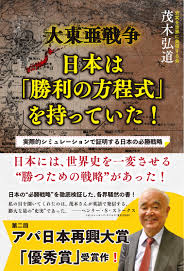shijitu「史実を世界に発信」
【書評】「史実を世界に発信する会」 茂木弘道
< 書 評 >
Japan’s Master Plan for Victory: What Could Have Been.
Moteki Hiromichi
原書「大東亜戦争:日本は勝利の方程式を持っていた」(ハート出版)
英文書評者:タダシ・ハマ
日本語訳(「史実を世界に発信する会」 )
いわゆる「太平洋戦争」については、決まりきった解釈が定番になっている。片や日本帝国、片や西欧とその同盟国の間の紛争であり、そもそも、日本側には勝つ見込みは皆無だった。無謀な戦争だったというわけだ。日本のGNPはカナダとほぼ同じだった。そんな国がどうして西欧に勝てるはずがあったろうか。一方では、日本は「心底からのワル」と蔑まれていた。「近隣諸国に対して全く同情心を持たない侵略国家」と決めつけられていたのである。その理窟を貫けば、日本はどんな無慈悲な攻撃を受けても自業自得だったということになる。
日本の歴史学者も怠慢なことでは西欧の学者にひけを取らない。唯々諾々と「定番の解釈」に追従している。日本帝国がなぜ武器を取って西欧に立ち向かう羽目になったのかを解明しようという努力を怠っている。しかし、米国人の中にも少数ながら、日本が西欧に立ち向かうに至った経緯を直視して来た人々はいた。米国でも、分別ある学者の中には、「定番の解釈」に束縛されずに、ありのままの真実を解明しようとしている人も少なくない。チャールズ・タンシルの『裏口からの参戦』はその例である。
連合国最高司令官だったダグラス・マッカーサー将軍は、1951年、米国上院軍事外交委員で証言をした。日本は基本的な資源の供給を全面的にアジア海域に依存していたのだから、これが手に入らなくなると社会的経済的に崩壊するしかなかったと述べた。したがって、「したがって彼らが戦争に飛び込んで行った動機は、大部分が安全保障の必要に迫られてのことだったのです」ということだった。
ところで、日本の戦争に大義があったばかりではなく、「勝利の戦略があった」ということを「対米英蘭蒋戦争終末促進に関する腹案」という大本営政府連絡会議で16年11月15日に採択された戦略構想に基づき主張したのが、本書である。その英文版が昨年発売されたが、英文版に対する書評をタダシ・ハマ氏が書いている。是非お読みいただきたい。
書評英語原文: http://www.sdh-fact.com/CL/JapansmasterE.pdf
書評日本語訳: http://hassin.org/01/wp-content/uploads/Japansmaster.pdf
令和4年1月21日 「史実を世界に発信する会」 茂木弘道
<Book Review>
Japan’s Master Plan for Victory: What Could Have Been.
Hiromichi Moteki
Society for the Dissemination of Historical Fact, 2020
Originally published as Daitoa senso: Nihon wa shori no hoteishiki wo motteita (Heart Publishers, 2018).
Reviewed by: Tadashi Hama
The dominant narrative of the so-called Pacific War, the conflict between Imperial Japan, the West and its allies, is that Japan’s defeat was “inevitable,” even “irresistible”. “How could a country with a GNP [gross national product] about that of… Canada expect to win…” against the West? On the other side of the same coin, Japan was written off as “basically evil,” an “aggressor nation” showing a “total lack of sympathy or respect for her neighbors.”
Few Japanese historians, as well as most Western historians, have bothered to transcend the “dominant narrative” in order to clearly understand Imperial Japan’s motivation to go to war against the West. A few Americans, though, have mulled over Imperial Japan’s decision to take on the West such as Charles Tansill, in his Back Door to War. General Douglas MacArthur, former Supreme Commander for the Allied Powers in Japan, stated his thoughts before a US Senate subcommittee in 1951. He stated: “[Japan’s] purpose… in going to war was largely dictated by security.”
Author Moteki Hiromichi picks up on the missing thread, of Japan’s strategic plan to ensure its own survival by grinding away at the US’s will to fight through a series of bold tactical, psychological, economic and military maneuvers. Moteki tells us that the missing thread that clearly showed that Japan thought carefully of her own survival, rather than world domination, was the “Draft Proposal for Hastening the End of War Against the United States, the United Kingdom, the Netherlands, and Chiang Kai-shek.”
This plan was duly adopted at a Liaison Conference between Imperial General Headquarters and the Imperial Government, held on November 15, 1941.
He analyzes the “Draft Proposal” as the strategy for Japanese victory In fact, Moteki points out that Prime Minister Churchill’s expressed his concern to President Roosevelt on April 15, 1942, in that should Japan control the Western Indian Ocean the British position in the Middle East would collapse and supplies to Russia would be cut. With the UK in a weakened position, according to the “Draft Proposal,” the US would “lose the will to continue hostilities against Japan.” Indeed, as we have seen with the US, a war without a strategy leads to a humanitarian disaster.
URL: http://www.sdh-fact.com/review-article/1861/
PDF: http://www.sdh-fact.com/CL/JapansmasterE.pdf
MOTEKI Hiromichi, Acting Chairman
for KASE Hideaki, Chairman
Society for the Dissemination of Historical Fact
Phone: 03-3519-4366
Fax: 03-3519-4367
Email moteki@sdh-fact.com
Note: Japanese names are rendered surname first in accordance with Japanese custom.

